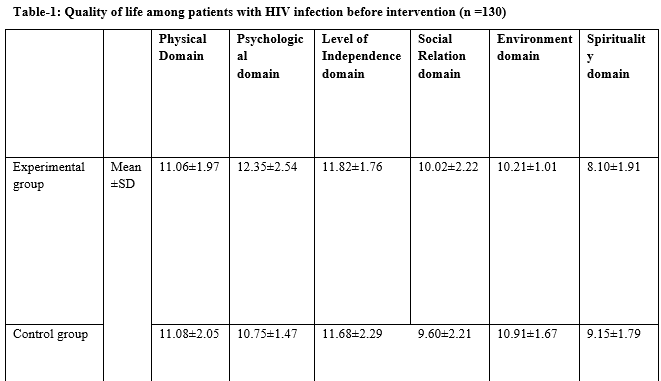Effect of nurse directed rehabilitation programme on quality of life among patients with HIV attending care and support centers of Kottayam district, Kerala, South India
Abstract
Background: HIV has become a long-term condition, which not only affect the physical health, but also lead to psychological and social problems. Nurse directed rehabilitation programme may help people by improving their overall health and their ability to deal with stress.
Objectives: To assess the pretest level of quality of life in both experimental and control group and to evaluate the effectiveness of nurse directed rehabilitation programme on quality of life.
Methods: This is a randomized control study conducted at selected Care & Support Centers under the Medical College ART unit of Kottayam District. Purposive sampling was done for selection of care & support centers and simple random sampling for patients. 130 HIV infected patients were selected for the study and randomly divided into 2 groups with Mean ±SD age of 35.84±7.45years. Both groups were homogenous. Experimental group were given rehabilitation programme for 30 minutes 4 days / week for 6 months. QOL Scale (WHOQOLHIV-BREF) was used to assess quality of life and outcome of rehabilitation programme.
Results: Findings show that there is mean quality of life (62.95) falls on the poor level among patient with HIV infection and 98% subjects experiences poor quality of life (χ2=0.341). Paired difference and t value proves that nurse directed rehabilitation programme highly significant in increasing quality of life (p<0.001) when compared with control group.
Conclusion: The practice of nurse directed rehabilitation programme is effective as an adjunct therapy in patients with HIV infection that significantly improves the quality of life.
Downloads
References
2. Ministry of Health and Family Welfare : HIV/AIDS wing; Kerala.August 2015. Available from http://www.the health site .com.
3. Mbada CE, Onayemi O, Ogunmoyole Y, Johnson OE,and Akosile CO. Health-related quality of life and physical functioning in people living withHIV/AIDS: H Qual Life Outco. 2013; 11: 106-107. [Pub Med]
4. Anandh V, D’sa IP, Alagesan J, Rathod V. Effect of Progressive Resistance exercises on cardio vascular fitness and quality of life in people with HIV/AIDS. J of Pharma and Bio Sci. 2011; 13(13): 19-22. Available from: http:// www.jpbms.info.
5. Ciccolo JT, Jowers EM, Bartholomew JB. The benefits of exercise training for quality of life in HIV/AIDS In the post-HAART Era. Sport. Med. 2004; 34 (8):487-99.
6. Mental Health: Evidence and Research, Department of Mental Health and Substance Dependence, World Health Organization. WHOQOL-HIV Instrument, Users Manual: Scoring and Coding for the WHOQOL HIV Instruments. Geneva: World Health Organization; 2002. Available from: http://www.who.int/msa/qol/
7. Baigis J, Korniewicz DM, Chase G, Butz A, Jacobson D. Effectiveness of a home-based exercise intervention for HIV-infected adults: a randomized trial. J Assoc Nurses AIDS Care. 2002; 13(2):33-45.
8. Folasire OF, Irabor AE, Folasire AM. Quality of life of people living with HIV and AIDS attending the antiretro viral clinic, University College Hospital, Nigeria. Afr J Prim Health Care Fam Med. 2012; 4(1): 294- 8. [Pub Med]
9. Anand D, Puri S, Mathew M. Assessment of Quality of Life of HIV-Positive People Receiving ART: An IndianPerspective.Orissa,India. In J Com Med.2012; 37(3):165.Availablefromhttp://www.ijcm.org.in/text.asp?
10. Anandh V, D’SA IP, Alagesan J , Rajendran K . Effect of Progressive Resistance Training on Functional Capacity, Quality of Life and CD4 Count in People with HIV/AIDS. Int J Physio Res. 2014, 2 (4):626-30. Available from: http:// www.ijmhr.org/ijpr.html.
11. Bommareddi P, Prabha B, Valsaraj S. Jacobson's progressive muscle relaxation (JPMR) Training to reduce anxiety and depression among People living with HIV NUJHS. 2014; 4 (1):71-78. Available from: http://www.nitte.edu.in.
12. Fukunishi I, Hosaka T, Matsumoto T, Hayashi M, Negishi M. Liaison Psychiatry and HIV Infection: Application of Relaxation in HIV Positive Patients. Psy.&Clinl Neuro sci .2005; 50: 305-308.

Copyright (c) 2016 Author (s). Published by Siddharth Health Research and Social Welfare Society

This work is licensed under a Creative Commons Attribution 4.0 International License.


 OAI - Open Archives Initiative
OAI - Open Archives Initiative


